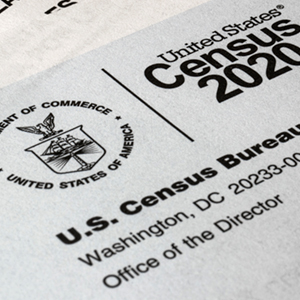2020 will be a busy year for the U.S. Census Bureau. In addition to the
2020 Census, it will be administering the American Community Survey and the
Current Population Survey. Knowing the difference, and how to spot scam
artists using the confusion such activity can bring, is crucial to smart
consumerism.
WHAT IS THE CENSUS?
The 2020 Census counts every person living in the 50 states, the District of Columbia and five U.S. territories. The count is for residents, not just citizens. The Census is mandated by the Constitution and conducted by the U.S. Census Bureau. Each home will receive an invitation to respond to a short questionnaire to be answered online, by phone or by mail.
WHY THE RESPONSES MATTER
When you respond to the Census, you are doing your part to ensure
decisions about your community can be made using the best data
available. The 2020 Census results will help in directing billions of
dollars in federal funds to communities for schools, roads and other
public services. Results from the 2020 Census will also help to
determine the number of seats that each state has in Congress.
PARTICIPATION IS MANDATORY
The U.S. Constitution mandates that a census be taken every 10 years to
count all people – both citizens and noncitizens – living in the United
States. You are required by law to participate and answer. The Census
Bureau is also required by law to protect your answers. Your responses are
used only to produce statistics. The Census Bureau does not disclose any
personal information. Participating in the Census does not excuse you from
participating in any other federal survey.
Census takers were set to visit homes in April to conduct quality check
interviews and drop off materials, and then return in mid-May to help
collect responses. The COVID-19 pandemic is
delaying
these efforts and especially impacting college students. Residents are
urged to go online to take the Census, ensure a fulsome count and form the
basis for the next decade’s representation and services. And this is where
the common scam artists enter the process.
COMMON SCAMS
The Census is ripe for two common scams: job scams and identity theft. Any
website connected with the Census will end in .gov. Anything else is not an
official government communication or website.
- Job Scams
:
In the lead up to the Census, the U.S. Census Bureau increases its hiring
of temporary census takers, field supervisors, recruiting assistants and
clerks. This presents an opportunity for criminals to post a job
opportunity on a website or social media, asking for applicants to become
temporary census workers. You click and fill out a form with your personal
information. They may charge a fee to apply or to give more information. In
a typical job scam, you often get a quick response from a “hiring manager”
who may want to interview you via phone or Google Hangout.After you are “hired,” the company may charge you upfront for “training.”
You may need to provide your personal and banking information to run a
credit check or set up direct deposit. You may be “accidentally” overpaid
with a fake check and asked to deposit the check and wire back the
difference. Or, you may need to buy expensive equipment and supplies (from
the scammers) to work at home.The Census Bureau does not have an application fee, and you can only apply
online. The Census
Jobs FAQ
Jobs FAQ can answer all of your questions. - Identity Theft and Phishing
:
The Census (as well as the American Community Survey and Current Population
Survey discussed below) asks a lot of detailed questions about things like
income, assets, job status, household amenities, even your commute. These
questions may set off your scam suspicions. While legitimate, the types of
questions also make the Census an attractive mechanism for identity thieves
to gain access to your information. However, the Census does not seek your SSN, bank account or credit card numbers or
personal information like your mother’s maiden name, nor does it seek money
or donations. Census fraud can hit at home or at work (the Census Bureau
conducts business-related surveys, too).When you get the Census in the mail, check that the return address is
Jeffersonville, Ind. If you are not sure you have a legitimate mailing, or
if you are not sure the person calling you is a legitimate Census employee,
contact the Census Bureau’s National Processing Center. The Census Bureau
will not send unsolicited emails. The agency almost always makes initial
contact by mail. If you get an email you suspect is bogus, forward it to
ois.fraud.reporting@census.gov. Do not click on any links or open
attachments.If someone comes to your door, ask for a valid ID badge with their
photograph. The ID should have the U.S. Department of Commerce watermark
and an expiration date. When in doubt about a Census taker, call
800-923-8282 or contact the
Regional Office
in your state.
RUMORS DEBUNKED
Rumors, false information and social media posts discouraging participation
can be the source of confusion. Scammers prey on this confusion. The Census
Bureau has a page for
FAQs
and
debunked rumors.
Any new rumors should be reported to rumors@census.gov. Please see The
Census Trust & Safety Team flyer
for more details on how you can debunk rumors.
AMERICAN COMMUNITY SURVEY
In 2020, the Census is not the only survey out in our communities. You may also be asked to take part in the American Community Survey (ACS). The ACS differs from the Census in two ways. First, the ACS runs every year
while the Census is only conducted once every ten (10) years. Secondly, the Census Bureau contacts only approximately 3.5 million randomly selected households across the country to participate in the ACS. The Census, however, counts
everyone.
The yearly ACS helps your community plan hospitals and schools, support school lunch programs, improve emergency services, build bridges, inform businesses looking to add jobs and expand to new markets and more. The ACS is mandatory under Title 18 U.S.C. §§3571, 3559. If you have any questions about the representative at your door, or concerns about an ACS call or mailed item, call 800-923-8282 or contact the Regional Office in your state.
CURRENT POPULATION SURVEY
A third official survey currently out is the Current Population Survey (CPS). The CPS is jointly sponsored by the Census Bureau and the U.S. Bureau of Labor Statistics. The CPS is the source of the nation’s unemployment rate and the primary source of information on the labor force characteristics in the U.S. population.
The CPS has a different methodology than the Census or the ACS. It goes out to only 60,000 randomly selected occupied households from all 50 states and the District of Columbia. If chosen, your household is in the CPS for four consecutive months, then out for eight months and then returned to the survey for another four months before leaving the sample. Expect field agents during the week that includes the 19 th of the month, e.g., weeks of May 17, 2020 or June 14, 2020. Unlike the Census and the ACS, your participation in the CPS is entirely voluntary. Residents are urged to cooperate with the
CPS, as its results help allocate resources and determine economic policies for individual states and provide other useful information.
If you have any questions as to the legitimacy of the documents, calls or
person at your door, and the purpose of the contact is identified as the
CPS, you can either call (301) 763-3806 or email CPSInfo@ask.census.gov.
For more information about this or other consumer issues, call the
Montgomery County Office of Consumer Protection’s (OCP) at (240) 777-3636
or visit montgomerycountymd.gov/OCP.



